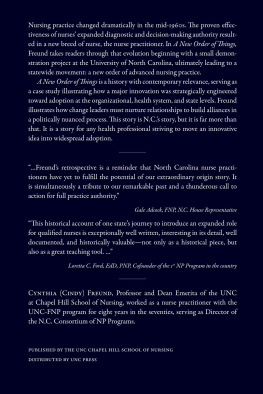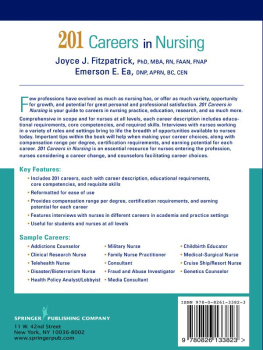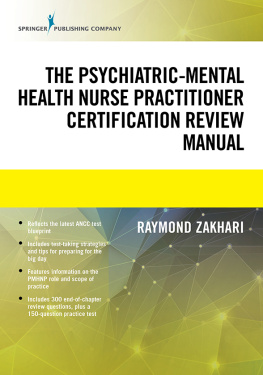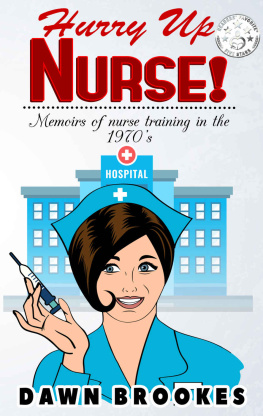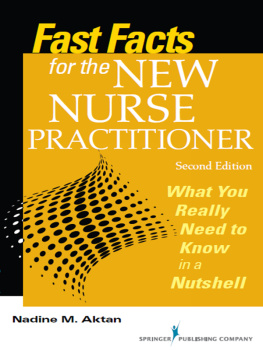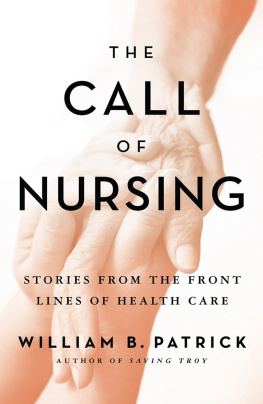Contents
Page List
Endorsements
This historical account of one states journey to introduce an expanded role for qualified nurses is exceptionally well written, interesting in its detail, well documented, and historically valuablenot only as a historical piece, but also as a great teaching tool. It lends itself to analyzing, synthesizing, and applying a theoretical framework of change and other theoretical constructs. This story of change describes in detail the strategies, logistics and tactics (personal, professional, political, and social) of a change process that was successful.
Loretta C. Ford, EdD, PNP
Cofounder of the 1st NP
Program in the country
Freund vividly brings to life her own and others lived experience through captivating first-person accounts of why and how North Carolinas first nurse practitioners were ushered into being. Her rich narrative, contextual insights, and retrospective analyses are both revelatory and instructive to contemporary nurse practitioners. The levers of change deftly used by Freund and her co-creatorscollegial relationships among and between nurses and physicians; professional organizational policy development; and strategic connections to political powerare just as relevant and basic today. Freunds retrospective is a reminder that North Carolina nurse practitioners have yet to fulfill the potential of our extraordinary origin story. It is simultaneously a tribute to our remarkable past and a thunderous call to action for full practice authority.
Gale Adcock, FNP,
N.C. House Representative
A NEW
ORDER
OF
THINGS
A NEW
ORDER
OF
THINGS
The Origins of a Nurse
Practitioner Movement
Cynthia Freund
COPYRIGHT 2022
Cynthia Freund
PUBLISHED BY
The University of North Carolina at Chapel HillSchool of Nursing
BOOK DESIGN
Katie Severa
All rights reserved. No part of this book may be used, reproduced or transmitted in any form or by any means, electronic or mechanical, including photograph, recording, or any information storage or retrieval system, without the express written permission of the author, except where permitted by law.
First Printing
Printed in the United States of America
Library of Congress Cataloging-in-Publication Data
Names: Freund, Cynthia M., author. | University of North Carolina at Chapel Hill. School of Nursing, issuing body.
Title: A new order of things : origins of a nurse practitioner movement / Cynthia Freund.
Description: [Chapel Hill, North Carolina] : The University of North Carolina at Chapel Hill School of Nursing, [2022] | Includes bibliographical references.
Identifiers: LCCN 2022022510 | ISBN 9781469672861 (paperback) | ISBN 9781469672878 (ebook)
Subjects: LCSH: University of North Carolina at Chapel Hill. School of Nursing--History. | Nurse practitioners--North Carolina--History. | Nurse practitioners--Training of--North Carolina--History.
Classification: LCC RT82.8 .F74 2022 | DDC 610.7306/92071175659--dc23/eng/20220608
LC record available at https://lccn.loc.gov/2022022510
DEDICATIONS
C. Glenn Pickard, MDThe Founder of North Carolinas Nurse Practitioner Movement
Many helped move the nurse practitioner concept from an innovation to a thriving advanced practice role, now a mainstay of the health care system. One person, though, C. Glenn Pickard, stands out as the most passionate and dedicated champion of nurse practitioners, and is considered by most the founder of North Carolinas nurse practitioner movement.
Lucy Conant, RN, PhDA Founding Partner in North Carolinas Nurse Practitioner Movement
Nurse practitioner programs of the late 1960s and 1970s were founded by nursephysician teams. Neither alone could have established a viable program. Lucy Conant came to the University of North Carolina School of Nursing as a new dean with the intention of developing a nurse practitioner program. Such commitment from the nursing school dean was an ingredient essential to the success of North Carolinas nurse practitioner movement.
Audrey Joyce Booth, RN, MSNA Stalwart Advocate
Audrey Booth was a mentor to many nurses in North Carolina for over twenty years. She guided and advised those who became leaders in the nurse practitioner movement, as well as those who became leaders in other areas of nursing and health care. She faithfully guarded nurse practitioners legal status and fought to maintain a delicate alliance between the long-standing nursing and medical regulatory boards of the state.
UNCs First Nurse Practitioner GraduatesThe Pioneers
They risked becoming nurse practitioners because they believed it was right and would be good for nursing. Despite at times doubting the wisdom of their decision, in the end they were proud nurse practitioner graduates of the first classthe pilot class of 1970. They stood at the forefront of the movement in North Carolina.
There is nothing more difficult to take in hand, more perilous to conduct, or more uncertain in its success, than to take the lead in the introduction of a new order of things. He who innovates has for enemies all those who have done well under the existing order of things, and only lukewarm supporters in those who may do well under the new....
From The Prince,
Niccol Machiavelli
(14691527)
TABLE OF CONTENTS
ACKNOWLEDGMENTS
I am grateful to many, but I offer my utmost gratitude to Glenn Pickard and Audrey Booth, the two people who got me started on my professional journey. Glenn first whetted my appetite to become a nurse practitioner. We quickly bonded as colleagues because we both loved the political side of moving this nurse practitioner innovation into the mainstream of North Carolinas health care system. We were both activists at heart, and he was a loyal supporter throughout our endeavors. Audrey Booth was a mentor in the most genuine sense. She showed me how all things political worked and helped me mature professionally in many ways. She soon became a lifelong friend, and for forty-seven years Audrey helped me be a stronger person professionally and personally. She lived one month shy of ninety-three years and was a life role model for almost five decades. I regret neither lived long enough to see this book in published form. Glenn and Audrey both awakened me to my adult purpose.
The friends I developed at Penn have remained my friends. Joan Lynaugh, Barbara Bates, Karen Wilkerson, and Neville Strump all valued history. Our discussions of nursing and medical history, especially around a dinner table complemented by wine, engendered many lively debates. And in that loving and congenial company, my desire to write North Carolinas nurse practitioner story was renewed. I am grateful for that intellectual prod I always experienced when with them, and just as strongly, I value the fun, friendship, and love we have shared and continue to share.
Many others also helped me bring the book to press. My former administrative assistant, Karen Hearne, came to my rescue once again, transcribing tapes, editing transcripts, and making order out of the stacks of papers I had collected related to this project. Betty Hughes, a dear friend, completed most of the first and second rounds of transcript editing. David Hughes, one night while talking about the book, recited an apt quotation from The Princewhich I could remember only in concept, but which he recalled word for word, and ultimately is used as the epigraph for this book.

